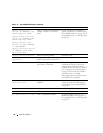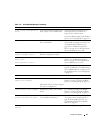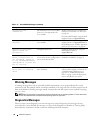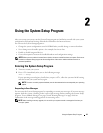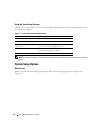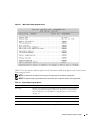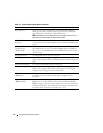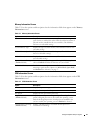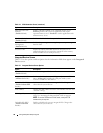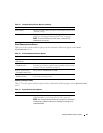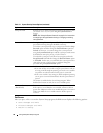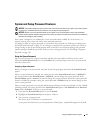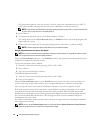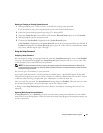
46 Using the System Setup Program
Boot Sequence Determines the order in which the system searches for boot devices
during system startup. Available options can include the USB diskette
drive, USB CD drive, hard drives, and USB flash drive.
NOTE: A USB device will be displayed in the boot order screen only if it is
attached to the system before the system enters BIOS.
Hard-Disk Drive
Sequence
Determines the order in which the system searches the hard drives during
system startup. The selections depend on the hard drives installed in your
system.
USB Flash Drive
Emulation Type
(Auto default)
Determines the emulation type for a USB flash drive. Hard disk allows
the USB flash drive to act as a hard drive. Floppy allows the USB flash
drive to act as a removable diskette drive. Auto automatically chooses an
emulation type.
Integrated Devices See "Integrated Devices Screen" on page 48.
PCI IRQ Assignment Displays a screen to change the IRQ assigned to each of the integrated
devices on the PCI bus, and any installed expansion cards that require an
IRQ.
Serial Communication See "Serial Communication Screen" on page 49.
System Security Displays a screen to configure the system password and setup password
features. See "Using the System Password" on page 51 and "Using the
Setup Password" on page 53 for more information.
Keyboard NumLock
(On default)
Determines whether your system starts up with the NumLock mode
activated on 101- or 102-key keyboards (does not apply to 84-key
keyboards).
Report Keyboard Errors
(Report default)
Enables or disables reporting of keyboard errors during the POST. Select
Report for host systems that have keyboards attached. Select Do Not
Report to suppress all error messages relating to the keyboard or keyboard
controller during POST. This setting does not affect the operation of the
keyboard itself if a keyboard is attached to the system.
Table 2-2. System Setup Program Options (continued)
Option Description



